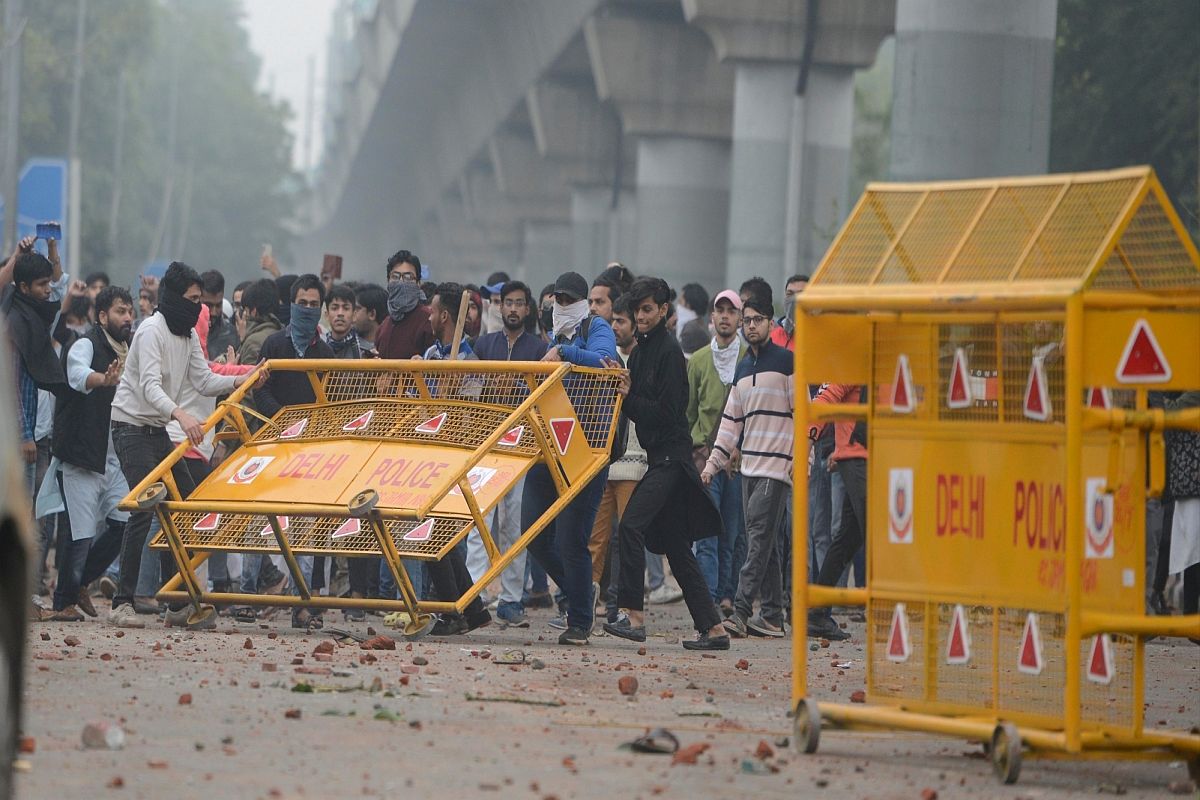Protests erupted across various campuses in the country against police crackdown on the students of Jamia Millia Islamia University on Sunday, who were agitating against the new Citizenship Act.
The protest against Citizenship Act turned violent on Sunday in the evening in southeast Delhi’s Mathura Road after the agitators resorted to arson and police used force practically turning the area into a war zone, leaving nearly 60 people including students, cops and firefighters injured.
Advertisement
Violence erupted following a clash between police and Jamia Millia Islamia (JMI) students who were protesting against the amended Citizenship Bill. At least five buses were set ablaze. Police used batons and teargas and were seen chasing protesters through the streets.
Petrol bombs targeted police personnel, ordinary citizens and the media as a raging mob that seized parts of south Delhi refused to let go.
The chief proctor of Jamia Millia Islamia has accused the Delhi police of forcefully entering the university campus and beating up the students.
Condemning the police action, university Vice-Chancellor Najma Akhtar had said that students who were inside the library have been moved out and they are safe.
However, the Delhi Police has denied reports of entering the University campus in the wake of violent protests.
Delhi Commissioner of Police, Southeast Chinmoy Biswal, said that protesters were merely pushed back and that the police had not resorted to any kind of firing.
The police are unwilling to confirm if petrol bombs were used in Sunday’s violence. They have also not confirmed if students were involved in the protest that led to violence.
The students have claimed that they have distanced themselves from violence.
A statement issued by the Jamia Milia University said that students were not involved in the burning of buses. “It is done by some outsiders who want to disrupt the peace in the university and the locality around it.”
Meanwhile, as many as 50 detained students of Jamia Millia Islamia were released early Monday even as the situation in the University remained tense after violent protests over the amended Citizenship Act, police said.
On Sunday night, the Delhi Minority Commission (DMC) had issued a direction to the SHO of Kalkaji Police Station to release the “injured” Jamia students held there or take them for treatment at a reputed hospital without any delay.
In the wake of violent protests against the new citizenship law in south Delhi, the Delhi Metro had suspended services at 12 metro stations as a precautionary measure.
Meanwhile, students have started leaving from Jamia as the University is closed till January 5 following yesterday’s incident.
Following police action at Jamia Millia, protests also erupted at Aligarh Muslim University, Hyderabad’s Moulana Azad National Urdu University and Banaras Hindu University.
The Aligarh Muslim University has been shut down till January 5 after violence erupted in the university late on Sunday night, in protest against the controversial Citizenship (Amendment) Act.
AMU students mounted a violent protest against the police crackdown on students in Jamia Milia in Delhi.
Cops used tear gas shells and lathi-charged students to disperse the mob. Angry policemen were also seen breaking the motorbikes parked outside the AMU campus.
Protests also erupted on the campus of Moulana Azad National Urdu University (MANUU) in Hyderabad against the police ‘brutality’ on students of the Jamia and AMU.
Students from Tata Institute of Social Sciences, Jadavpur University and IIT Mumbai have also come out in support of Jamia Millia Islamia students.
President Ram Nath Kovind, in a late Thursday night order, gave his assent to The Citizenship (Amendment) Bill, 2019, letting it become an Act allowing Indian citizenship to six non-Muslim minority migrants facing religious persecution in Pakistan, Bangladesh and Afghanistan.
According to the new law, members of Hindu, Sikh, Buddhist, Jain, Parsi and Christian communities, who have come from Pakistan, Bangladesh and Afghanistan, till December 31, 2014, facing religious persecution there, will not be treated as illegal immigrants but given Indian citizenship.











